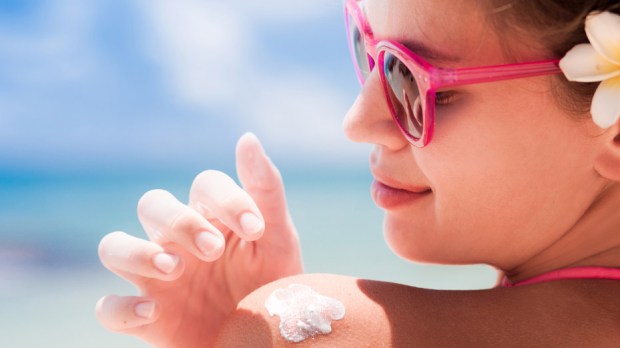We all know sunscreen is important. But as the summer days call us into the sun, it’s just as important to be able to tell myth from fact when it comes to sunscreen use. How well do you know the scoop on sun protection?
1. The more you wear, the better
Although it is important to apply a good layer (but not to the point of looking like a ghost), what matters most is frequency. Applying half a bottle will do you no good if you spend two hours at a time in the ocean, then dry off with a towel (taking off more than 80 percent of whatever sunscreen is still on your skin), and then play volleyball without reapplying. Sunscreen should be applied every two hours and you should complement it with other things, such as beach hats. Also, it is best to apply it 30 minutes before exposing yourself to the sun to make sure your skin has time to absorb it.
2. I just need protection on my face and at peak times
Skin cancer can develop anywhere on the body, so it’s important to protect everything (even behind the ears, especially if you have very short hair). We must certainly be more careful during peak times (between 12:00 and 5:00) but don’t forget the other hours of the day when UVA and UVB rays affect us even if we do not feel it with as much intensity.
3. Sun is good for my acne
A tan can hide some red patches and the sun can certainly give you the sensation of “drying out” that annoying outbreak. However, all this is temporary and in the long run it is harmful: the sun dries out the skin, causing the sebaceous glands to produce more oil, which leads to more acne. In addition, if a pimple breaks your skin and then gets sunburned, it is more likely that your skin will be stained in that spot.

Read more:
Why you need to add coconut oil to your daily beauty routine
4. After 30 SPF, all sunblocks are the same
Although the difference between a 30 SPF and a 90 SPF sunblock is not a big one, it does exist; in fact, it is 3 percent. However, a 30 SPF sunblock is more than enough as long as you use it correctly (remember, reapply every two hours).
5. My makeup already has sun protection, so I’m covered
Although your foundation or compact powder may have some SPF protection built in, it is not the same as applying a sunblock that is absorbed by the skin. Dermatologists recommend that you apply sunblock about 15 minutes before your makeup and then proceed to do your routine normally.
6. If I apply sunblock, I will not tan
False! You can get a nice tan even while protecting your skin from the dreaded ultraviolet rays, but you must have patience and be aware of your natural tone. Those who do not apply sunblock or use oils to accelerate the tanning process end up burning, which is totally different and very harmful.
7. I can continue to use the same bottle year after year
Sometimes we just go to the beach for a couple of days and we think we can keep the same bottle of sunblock until next year. But be careful: sunblock has an expiration date. It also needs to be stored in a dry place out of direct sunlight so that it keeps all its properties. Sunscreen labeling has changed recently, too, so make sure yours is up to date.
Read more:
10 Easy Parenting Tricks to Keep Your Kids Out of the ER This Summer
8. “I’m allergic”
Some women are allergic to certain sunblocks but this does not mean that they are all made with the same ingredients. If you have had an allergic reaction or your skin is very sensitive, look for a physical (or mineral) sunblock instead of a chemical one. That is, look for one containing zinc oxide or titanium oxide.
9. Dark skin needs less protection
All skin types need protection. However, it is true that darker skins have more melanin than light ones, so they have more natural protection and can go with a product with a smaller sun protection factor. But it should be clarified that that extra melanin does not protect against UV rays, which are the ones that cause premature aging and even cancer.
10. I only need to use sunblock when I’m on vacation
Sunscreen should be a product for daily use for people of all ages and skin tones. Sometimes we think only the sun on the beach is harmful, but the sun in the city is too. So we must protect ourselves, not only for aesthetic reasons but above all, for the health of our skin.
This article was originally published in the Spanish Edition of Aleteia.

